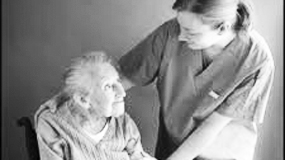
Recent events at St. Joseph’s at Fleming have caused controversy in the Peterborough community. Elder abuse caught on a hidden camera planted by a resident’s son, Camille Parent, has shed new light on the conditions some patients face.
Those charged with the task of this care are Personal Support Workers (PSW), who in light of these events, are under scrutiny for how they conduct themselves in their professions.
Registered Nurses (RN), who wish to remain anonymous, shared their experience of working with PSWs and the challenges faced when providing this patient care.
PSWs act as a support for those who cannot perform basic duties and functions themselves, such as assisting with mobility, personal hygiene, and lifestyle management.
Arthur asked how PSWs who must undergo these mentally and physically straining tasks are employed.
“You can do a course, spanning 31 weeks to a year, in order to become a PSW worker,” said one nurse, “so you have many people who look at the wage PSW workers are offered and think the one-year course is pretty worth it, considering the job market right now.”
“As RNs, we have to supervise and educate PSW workers, which is a much more challenging task that people expect,” said another nurse.
The nurse went on to explain the type of people that she has met who fall into this line of work.
“Where we have to go through extensive training and education to understand various patient conditions, PSWs can be anyone from the public who take this year-long course and have the duties of taking care of a person. If that PSW is a frustrated individual who hates their profession, they tend to take it out on the patient.”
The response from the PSW community is that there are far more good PSW workers who genuinely do care about the well being of patients, and the training involved stresses that the health and safety of them is their first priority.
When asked about the kind of abuse they have witnessed, the nurses confirmed that this is not uncommon.
“It would be wrong to generalize all PSW workers and say they hate their jobs, but we have had to supervise and train people … who are frustrated and lack respect for the guidelines in place in patient care, and for us who are younger college and university students working above them,” the RN said.
“An example of this is administrating medication,” said the other nurse.
“PSWs aren’t allowed to issue any sort of medication. It must be done by a health care professional, and PSWs are only allowed to extract it from the bottle and give it to the patient. This is a system that is sometimes unmonitored and abused.”
An example they gave was of a PSW who took the pills assigned for individual patients and put them into one pill dispenser. The PSW appeared to follow protocol, going from patient to patient, giving them their medication, but the nurses claim that having to fish it out of a mixed pill container leaves far too much room for error.
The nurses also described situations which were far too similar to the images captured by the hidden camera at St. Josephs. The nurses explained that PSWs who they have seen “angry and frustrated at their jobs” will be overly rough with seniors who suffer from ailments such as Alzheimer’s and Dementia.
They allege that these PSWs wake the patients up by startling them, banging their beds and shaking them awake. Instances of neglect and abuse like this are easy to monitor but the nurses claim to have seen behaviour like this go without reprimand many times.
“The sad truth is, it is difficult to monitor because it happens too frequently. This is so common that to put a system in place that stops this will require a lot of change in a profession that is expected to boom in the coming years.
“PSW work is guaranteed work in this community, with the need for it only growing. There should be a system in place to make sure they are following guidelines, and it would make our jobs better as well, as we have to often deal with the repercussions.”
The movement is already in place to change the PSW registry system. The new registry will allow for seniors and families to check out the personal support worker they want by their qualifications and experience.
Health Minister Deb Matthews calls it a system that, “For the first time ever, recognizes personal support workers.”
A Toronto Star article on the new registry reports that some PSWs cared for clients suffering from dementia, even though they didn’t have the proper training to manage them.
The new registry looks to solve these issues, with more than 180,000 Ontarians suffering from Alzheimer’s disease and other forms of dementia.
By the year 2020 that number is expected to jump by 450 per cent, doubling the demand for PSWs by 2031.
